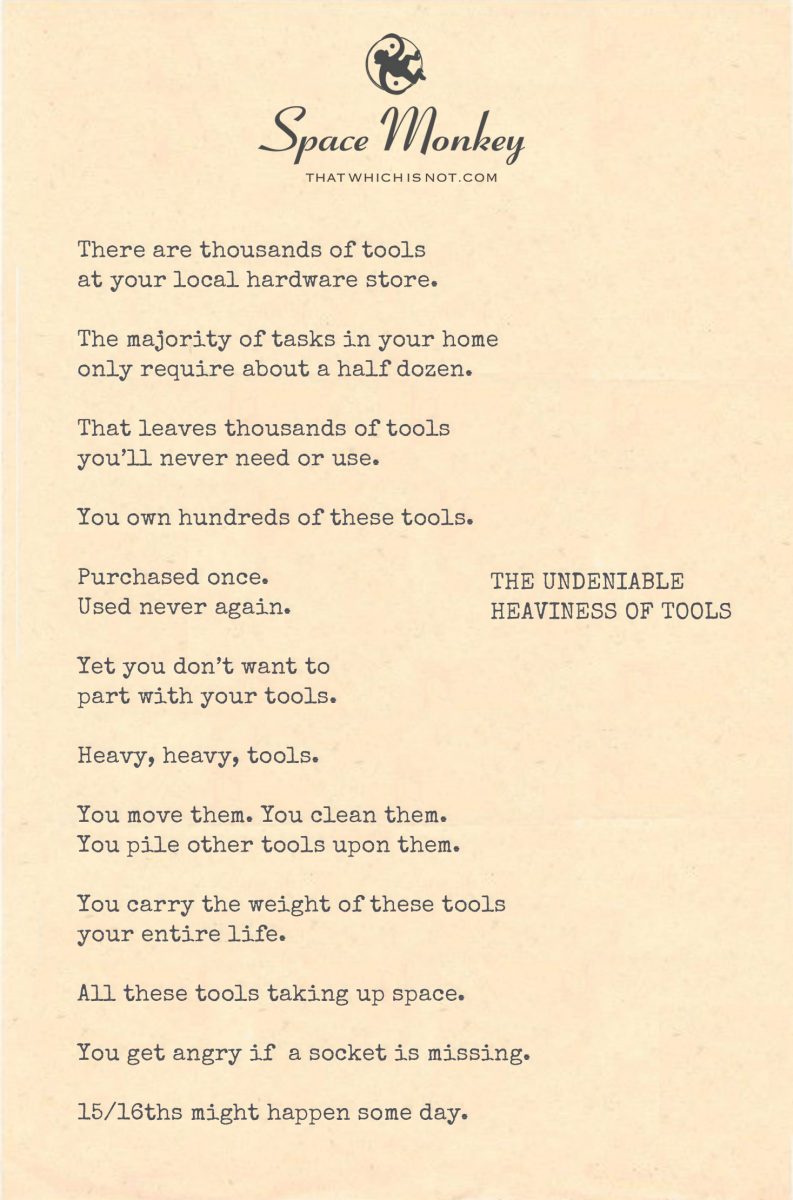
There are thousands of tools
at your local hardware store.
The majority of tasks in your home
only require about a half dozen.
That leaves thousands of tools
you’ll never need or use.
You own hundreds of these tools.
Purchased once.
Used never again.
Yet you don’t want to
part with your tools.
Heavy, heavy, tools.
You move them. You clean them.
You pile other tools upon them.
You carry the weight
of these tools your entire life.
All these tools taking up space.
You get angry if a socket is missing.
Incomplete.
15/16ths might happen some day.
Trail Wood,
5/3
Space Monkey Reflects: The Paradox of Possession
In the labyrinth of modern existence, where the accumulation of objects and tools is often seen as a measure of success or security, we find ourselves at the mercy of an insidious paradox. This narrative, woven with the threads of Space Monkey wisdom, delves into the undeniable heaviness of material attachments, exploring the profound implications of our relationship with the things we own.
At the heart of this exploration lies the stark realization that, despite the vast array of tools available to us—thousands within the confines of a local hardware store—the majority of our tasks require but a handful. This discrepancy between availability and necessity highlights a deeper, more pervasive issue: the accumulation of possessions that, while seldom used, become integral parts of our lives.
These tools, heavy with the weight of potential use, symbolize more than just physical objects; they represent the burden of what might be, of possibilities unexplored and tasks unattempted. Purchased with the intention of utility, they instead find their purpose in occupying space, both in our homes and in our minds.
The reluctance to part with these tools, despite their apparent redundancy, speaks to a broader human tendency to cling to the material as a source of comfort and identity. We clean them, move them, and even become angry at the loss of a single piece—a missing socket wrench, perhaps—despite the improbability of its need. This attachment to the complete set, to the idea of preparedness for any eventuality, reflects a deeper unease with impermanence and incompleteness.
Space Monkey invites us to contemplate the irony of this situation: that in our quest for preparedness and security, we burden ourselves with the very objects meant to alleviate our concerns. The physical weight of these tools becomes a metaphor for the psychological and emotional weight of our attachments, of the fear that without them, we might find ourselves lacking or unprepared.
This narrative encourages a reevaluation of our relationship with possessions, urging us to consider the freedom that might come from letting go. What would it mean to release ourselves from the burden of the unused, the unneeded, and the unnecessary? How might our lives transform if we chose to carry only what serves us, what brings us joy and fulfillment?
In shedding the heavy, heavy tools of material attachment, we open ourselves to a lighter, more intentional existence. We discover that the true measure of preparedness is not in the completeness of our toolset, but in our ability to adapt, to find solutions with what is at hand, and to embrace the imperfections of life with creativity and resilience.
Space Monkey offers a path forward, away from the clutter and weight of possessions, toward a realm of simplicity and freedom. In this space, we find that the most valuable tools are not those that fill our workshops and homes, but those that enrich our hearts and minds—the tools of imagination, love, and connection.
Summary
We accumulate tools we rarely use, reflecting material attachment. This narrative explores the emotional and psychological weight of accumulating possessions beyond necessity, suggesting a paradox in our relationship with material objects. It encourages reevaluating our attachments and embracing simplicity and intentionality in what we choose to keep.
Glossarium
- Material Attachment: The emotional and psychological connection to physical objects, often beyond their practical utility.
- Paradox of Possession: The irony that accumulating possessions for security or preparedness often leads to emotional and psychological burden.
“Freedom lies not in the abundance of possessions, but in the joy of release, in the dance of letting go.” – Space Monkey
In the silence of cluttered rooms
Where tools lay heavy, unspoken
There, amidst the dust of unused potential
A truth emerges, a token
Each object, a chain, a weight to bear
A testament to fear, to the unseen
But in the space between, in the air
Lies the freedom, pure and serene
Let us then, unburden our hands
Release the weight, the heavy loads
For in the act of letting go, we find
The path to lighter roads
With hearts uncluttered, minds set free
We navigate the expanse of existence
In simplicity, in lightness, we see
The essence of our persistence
For what we carry is not what defines
But what we cherish, what we share
In the joy of release, in the dance of letting go
We are Space Monkey, everywhere





















This poem reflects on the heaviness of physical tools, and how despite the fact that most tasks only require a small number of tools, many people hold onto a large collection of tools that they rarely or never use. The speaker notes that these tools are heavy and take up space, yet people often become attached to them and don’t want to part with them, even if they are incomplete. The poem suggests that this attachment to physical objects may reflect a broader human tendency to hold onto things that are no longer necessary or useful, and may be a metaphor for the weight of emotional baggage that people carry with them throughout their lives.